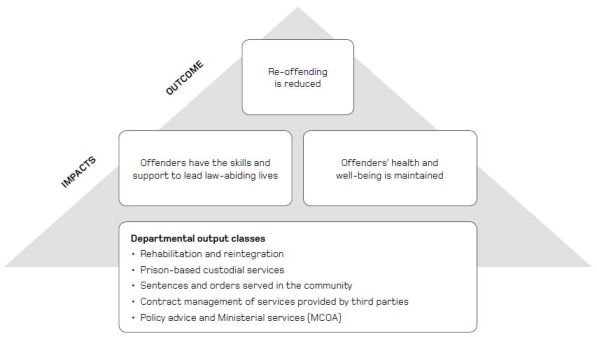Reducing re-offending

Cutting the rates of re-offending adds significantly to the social well-being of our communities. This is our ultimate goal.
Re-offending is reduced when offenders:
- address behaviours that contributed to their offending
- find employment when released from prison
- re-integrate into the community, finding stable accommodation
- maintain their health and well-being
- are managed fairly and decently, and with respect.
We know that our interventions can create lasting change in offenders’ lives. Levels of re-offending have decreased, and we will build on this success. Rates of re-imprisonment 12 months after release have fallen moderately in the last two years, with the latest results for prisoners released during 2009/10 being 27 percent compared to 28 percent for those released during 2008/09. Over the same period, reconviction amongst offenders who began community-based sentences dropped from 32 percent to 30 percent.
We have committed to achieving the Government’s challege to reduce re-offending by 25 percent by 2017. This will mean 600 fewer prisoners re-imprisoned one year after release and 4,000 fewer offenders being reconvicted within a year of beginning their community-based sentence. In particular we will reduce re-offending amongst Maori and young people, and reduce the seriousness of re-offending overall.
In working towards this target, over the next three years we will place offenders at the centre of our efforts, working with individual offenders to provide them with education, training, employment and other rehabilitative and reintegrative activities to assist them not to re-offend.
Our goal of reducing re-offending cannot be achieved by Corrections alone. In the community, local staff will develop relationships with local providers to better harness existing resources. At a national level, we will target the large government and community agencies that can help us make significant headway in reducing re-offending. Our job is to open up Corrections to these agencies and to find new and better ways of working with them so that together we can support offenders to turn their lives around.
|
We will demonstrate our success by 2015 through:
|
The recidivism index measures the rate of re-conviction and re-imprisonment of offenders following their release from prison or the commencement of communitybased sentences and orders. The index also measures the degree of seriousness of offending in comparison to previous offending.
This outcome is supported by two impacts:
- offenders have the skills and support to lead law-abiding lives
- offenders’ health and well-being is maintained.
Offenders have the skills and support to lead law-abiding lives. |
Offenders typically have lif e-long problems, such as addiction, mental health issues, low levels of educational attainment, poor literacy, lack of employment skills and dysfunctional family relationships.
We will work with offenders to plan rehabilitative interventions that will build skills and help them to address and overcome their offending behaviours. We have developed new measures that strengthen our ability to demonstrate the success of our interventions.
Over the next three years, we will work towards our goal of reducing re-offending by 25 percent by:
- increasing the range and availability of drug and alcohol treatment for offenders, ensuring that prisoners who have an identified drug and alcohol problem are receiving some help and expanding the availability of drug and alcohol treatment to offenders in the community
- expanding the rehabilitation programmes that are proven to reduce re-offending to cover more people, particularly focusing on young offenders, those on remand or short sentences, and those serving sentences in the community
- enhancing rehabilitation services provided directly by probation officers for higher risk offenders on community sentences
- delivering effective rehabilitation in partnership with iwi and community groups
- implementing working prisons and increasing prisoners’ participation in education and employment
- working with employers and industry to provide real jobs for offenders after release from prison
- partnering with iwi and communities to establish reintegration centres that support offenders’ social and accommodation needs.
|
We will demonstrate our success by 2015 through:
|
Offenders' health and well-being is maintained |
By providing offenders with a safe, secure and healthy environment, they will be encouraged and supported to change towards an offence-free lifestyle.
We will incorporate tikanga Maori into the ways that we deliver services. Our staff will be highly responsive to the needs of Maori offenders.
Unnatural deaths in prison is an area of concern for the Department, and we are committed to addressing the slight upward trend we have recorded in recent years.
We will provide primary healthcare to prisoners. Every new prisoner will have their health needs assessed with ongoing care and treatment provided according to their clinical needs.
We will further succeed in maintaining prisoners’ health and well-being by:
- working with the Ministry of Health and District Health Boards to establish a high dependency unit for prisoners with complex health needs
- introducing a suicide prevention strategy, and implementing the mental health screening tool in our prisons.
|
We will demonstrate our success through:
|

